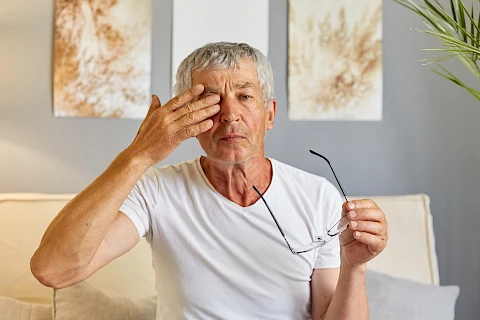
As we grow older, our eyes undergo changes that can affect our vision. Eye health is particularly important for seniors, as early detection of eye issues can significantly improve quality of life. Caregivers can help identify early signs of eye problems and ensure that seniors get the medical attention they need. Remember, always consult a doctor if you have concerns about your loved one's eye health.
1. Cataracts
Cataracts occur when the eye's lens becomes cloudy, leading to vision impairment. This condition is quite common among seniors and can develop slowly over time. Early warning signs include blurry vision, difficulty seeing at night, and sensitivity to light.
As a caregiver, ask the seniors in your care the following questions:
- Have you noticed any changes in your vision clarity?
- Are you having trouble seeing in low-light conditions?
2. Glaucoma
Glaucoma is a group of eye conditions that cause damage to the optic nerve, often linked to high eye pressure. Early detection makes it easier to manage this condition and prevent significant vision loss. Watch out for loss of peripheral vision, eye pain, and halos around lights.
You can ask:
- Do you experience any eye pain or pressure?
- Have you noticed any changes in your side vision?
3. Age-Related Macular Degeneration (AMD)
AMD affects the central portion of the retina, leading to central vision loss. This condition can make daily tasks like reading or recognizing faces challenging. Difficulty reading or recognizing faces and straight lines appearing wavy can indicate AMD.
Some questions you might ask your senior loved one are:
- Are you having trouble reading small print?
- Do straight lines appear distorted to you?
4. Diabetic Retinopathy
Diabetic Retinopathy is a complication of diabetes that damages the blood vessels in the retina. Managing blood sugar levels can help control this condition, but early detection is crucial. Early warning signs are floaters, blurred vision, and dark areas in vision.
Ask your senior loved ones:
- Have you noticed any spots or floaters in your vision?
- Is your vision sometimes blurry?
5. Dry Eye Syndrome
Dry eye syndrome occurs when the eyes don't produce enough tears or the tears evaporate too quickly. This condition can be uncomfortable and, if left untreated, can lead to serious eye problems. Stinging or burning sensation, redness, and feeling of something in the eye can be signs of dry eye syndrome.
Questions you should a senior include:
- Do your eyes often feel dry or irritated?
- Are you experiencing any redness or discomfort?
6. Presbyopia
Presbyopia is an age-related condition where the eye's lens loses its flexibility, making it difficult to see close objects clearly. This is a natural part of aging and is usually corrected with glasses or contact lenses. Early warning signs are a need to hold reading material at arm's length and headaches from close work.
Questions that you need to ask the seniors in your care include:
- Are you finding it harder to read up close?
- Do you get headaches after reading or doing close work?
Ensure Senior Eye Health Today
Early detection and regular eye check-ups help seniors maintain good eye health. As caregivers, staying vigilant and asking the right questions can help identify potential eye issues before they become more serious. For residents in Gladstone, Kansas City, and Liberty, Senior Helpers Kansas City North can provide support and assistance. Contact us today to learn more about our services.